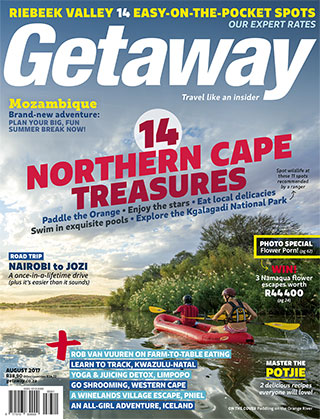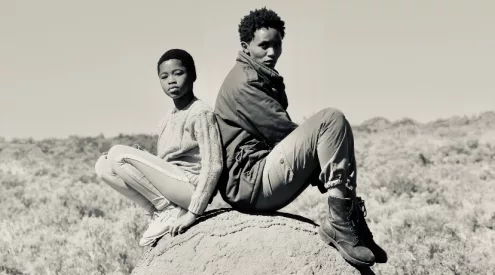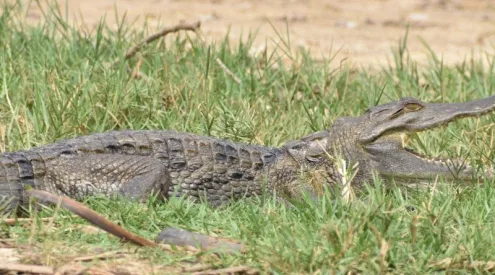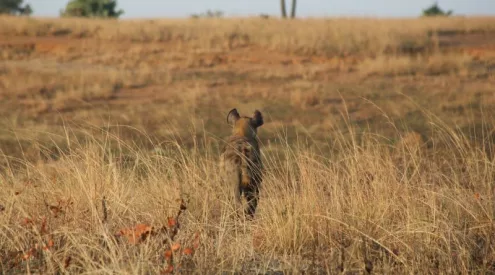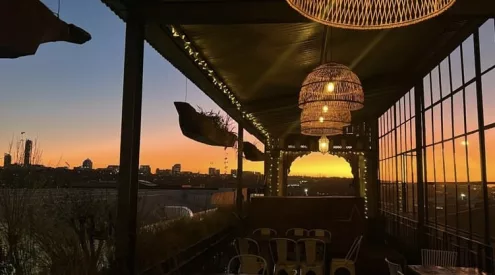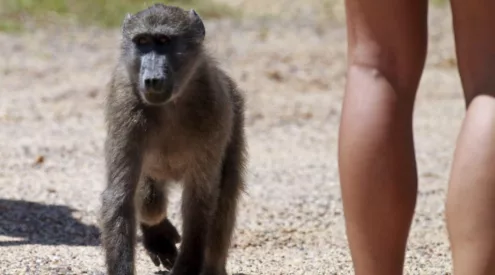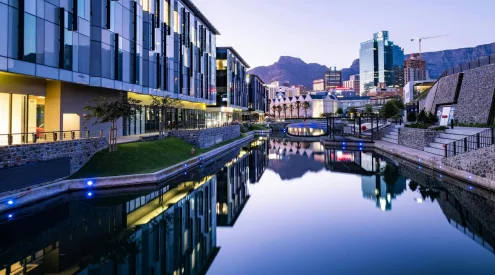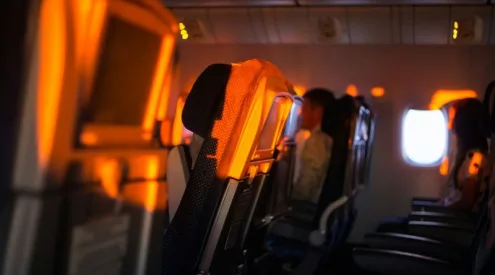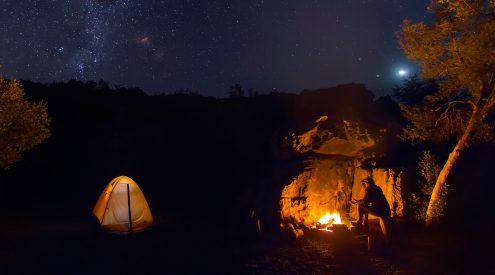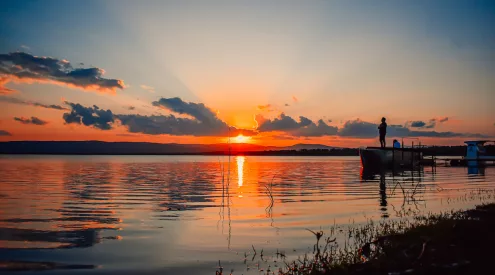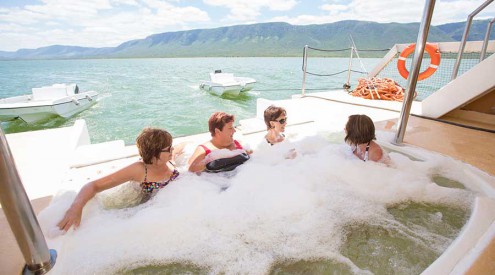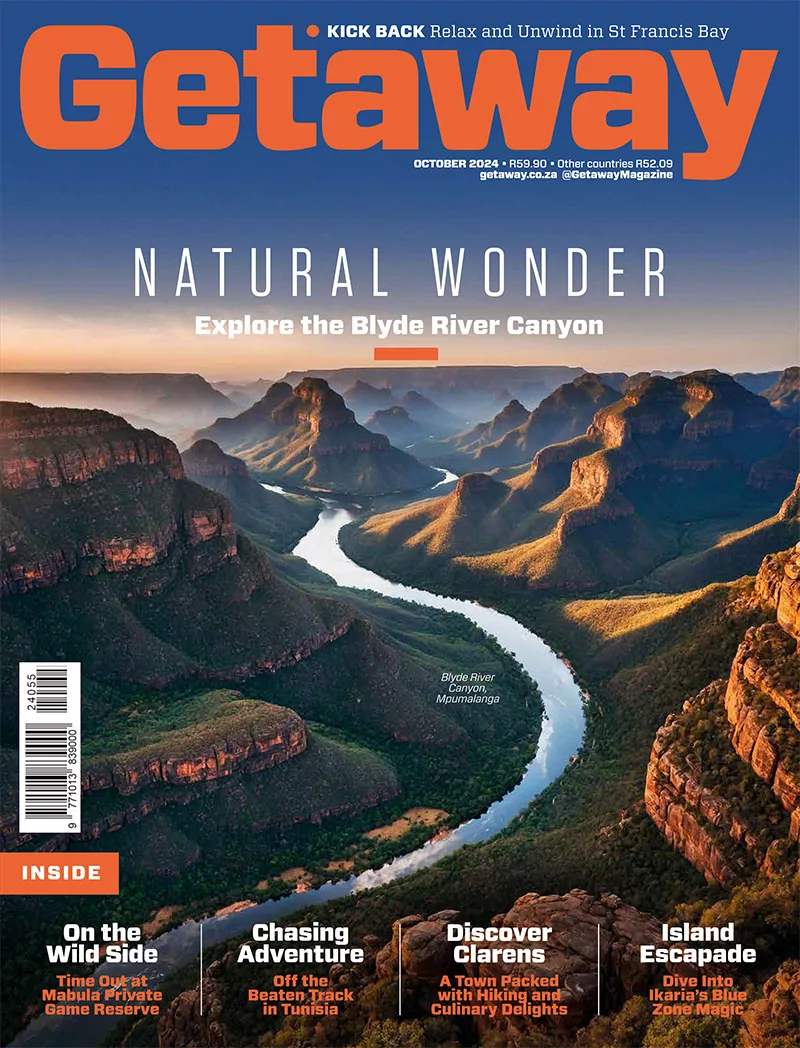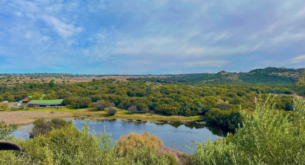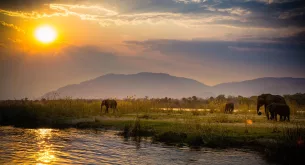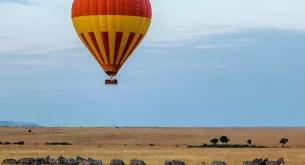The first official transfrontier park in Africa, the Kgalagadi is a sought-after destination for many South Africans. The park is enormous and camps get fully booked a year in advance, but you’ll still find yourself driving alone for hours.
The immense landscape stretches across South Africa and Botswana, covering over 3,5 million hectares – almost twice the size of Kruger. Yep, even a short stay is worth the long drive to get here, plus there’s plenty to do and see on the way. Here’s our top tips for a brilliant trip.
On the way to the Kgalagadi Transfrontier Park
Overnight at Vanzylsrus

Art in the quirky courtyard is inspired by desert creatures: scorpions, chameleons and meerkats. Photo by Melanie van Zyl.
If travelling from Joburg, this quirky boutique hotel is the ideal stopover en route to the Kgalagadi. There are beautiful mosaics, unusual light fittings and the six rooms are set around a tranquil courtyard. The hotel bar is where you’ll want to spend the evening, though. Being the local watering hole, all kinds of Kalahari characters come and go; some even offer thick chunks of gemsbok biltong. You’re also sure to meet other travellers heading from the park to share tips about sightings and road conditions.
Stay here B&B at the hotel is R590 per person sharing. For dinner, try the game pie with salad – at R55, it’s a bargain. vanzylsrushotel.com
Getaway tip
The infamous R31 dirt road takes about two-and-a-half hours to Twee Rivieren. It had been freshly graded and was an easy drive, but the road can get badly bumpy and corrugated (people have been known to abandon trailers because they broke on the way). If this is the case, there’s a great tar road on the Botswana side (passports and vehicle documentation required).
Try the best milk tart around

In addition to milk tart, Diamon T makes a mean milkshake. Photo by Melanie van Zyl.
Diamond T Coffee Shop in Askham (a blink-and-you’ll-miss-it village on the tar road to Kgalagadi Transfrontier Park) serves its milk tart warm, almost like custard on a bed of crumbed biscuits. If you need an excuse to stop for milk tart, tell the others there’s a fuel station here too – a good place to fill up because the pumps at Twee Rivieren in the park are unreliable. Diamond T also serves delicious milkshakes and a tasty homemade springbok pie, with salad, chips and a great ambience alongside the fountains (we ordered ours to take away and ate it under a camelthorn tree at the Kamqua picnic site in the park).
Cost: A slice of milk tart costs R28, a pot of filter coffee is R20, but it easily gives you two cups. Tel 0545110025.
Tuck into Aunt Koera’s real roosterkoek
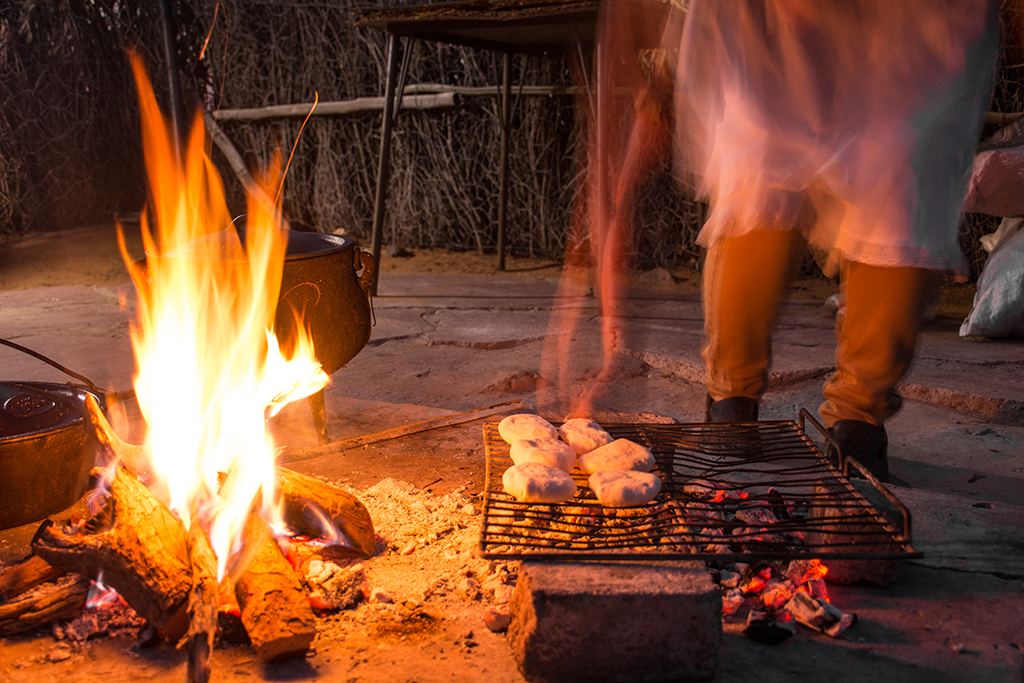
Aunt Koera prepares dinner at the Erin Game Farm. Photo by Melanie Van Zyl.
You’ll find Aunt Koera rolling and cutting up dough for fresh roosterkoek, best served alongside her lamb stew with sweet carrots and a salad made using the wild and tangy ‘gemsbok cucumbers’ grown in the Kalahari.She especially enjoys cooking over the fire because it keeps with the traditions of Kalahari cuisine and, besides, true roosterkoek is not something one can make on a stove.
Cost: Meals from R120 per person. Call ahead to book. Tel 0835888346, khomanisan.com.
Read the dunes at Kalahari Trails

Footsitter, one of the rescued meerkats at Kalahari Trails. Photo by Melanie van Zyl
The Kalahari Trails sanctuary is different to your average animal shelter. There is no petting and no fences or cages – it’s a wild home for rescued meerkats who were once illegal pets. The meerkats are cute and it’s a joy to watch them warm up around the burrow at sunrise. But it’s the dune walk that’s really worth going for – you’ll be stooping down on the dunes to learn the difference between Cape fox and bat-eared fox tracks, see how spiders walk and where they sit down, leaving the tiny imprint of their abdomen and eight legs spiralling out around it. This is the Kalahari you don’t see from the car.
Cost: Walks start just after sunrise, before wind blows the evening’s tracks away. R150 per person (booking essential). Check the Facebook page for dates of upcoming stargazing evenings. Tel 0545110900 kalahari-trails.co.za.
Stock up on beer and braai meat at the Kgalagadi Lodge

SJ’s scrumptious salad is perfect with craft beer; recently redecorated the self-catering chalets at Kgalagadi Lodge are super comfy. Photo by Melanie van Zyl.
Just five kilometres from Twee Rivieren on the R360, the Kgalagadi Lodge shop and accommodation complex is more than just an overnight stop – it serves Kalahari Craft Beer, named after animals from the area: Gemsbok Lager and Puff Adder Weiss (R45 per draught). Soon there may be camel rides too. Owner SJ Koortzen has hospitality in his blood – his grandfather opened the first guest house in the Kalahari ‘just down the road’. Along with the beer, we also discovered the best lunch in town: SJ’s Salad – thinly sliced steak, blue cheese and fresh rocket from his garden. Generous, fresh and delicious (R95). While you’re here, stock up on local lamb and wild game meat to braai in the park.
Stay here: There is recently revamped accommodation and camping here too. If you want to stay outside the park, just keep in mind our tips for day visitors below. From R350 per person sharing for a braai-only chalet.
Inside the unmissable Kgalagadi

These majestic Gemsbok get a golden glow thanks to the Kalahari dust at sunset. Photo by Melanie van Zyl
There are 19 predator species including leopard, cheetah and both types of hyena, but the most famous is the handsome black-maned Kalahari lion. However, this is also the place to appreciate smaller creatures: a puff adder slithering down a ground-squirrel hole, the entertaining antics of meerkats and keeping your eyes peeled on the burrows that line the gravel roads to catch sight of the Brants’ whistling rat poking its whiskers out.
Expert info: the best predator spots

This graceful cheetah was one of three brothers I spotted in the Nossob Riverbed. Photo by Melanie van Zyl.
Micho Ferreira, section ranger for Twee Rivieren, has the scoop on the action:
In the Twee Rivieren section, Kij Kij waterhole is good to see predators such as lion and hyena, while Leeudril waterhole is good for watching flocks of sandgrouse flying in to drink during dry periods.
At Kij Gamies viewpoint, which is elevated by a high dune (on the lower dune road), you sit far from the water point below you but have a very good view over the surrounding duneveld.
Batulama and Montrose waterholes in the middle of the Auob Riverbed are potentially good ones for seeing leopard.

Kgalagadi offers premium mammal viewing because of the sparse vegetation and concentration of animals in the dry riverbeds of the Auob and Nossob Rivers. Photo by Melanie van Zyl.
The Mata-Mata section is known for giraffe south from the Sitzas to Kamqua waterholes. In the past, spotted hyenas loved to den in the vicinity of the latter.
In the Nossob section, the Cheleka waterhole sometimes presents good leopard sightings and Kaspersdraai has good lion sightings.
The Nossob bird hide can be visited without leaving camp and a spotlight makes it possible to watch animals well into the night. It’s often visited by lions.
Cubitje Quab is one of the best waterholes to see black-backed jackals catching doves or sandgrouse.
Count the stars at !Xaus Lodge

Thanks to superb stargazing, !Xaus Lodge hopes to become SA’s first internationally accredited Dark Sky Reserve. Photo by Melanie van Zyl.
The only concession lodge on the South African side of the Kgalagadi Transfrontier Park, !Xaus Lodge pays homage to the cultural heritage of the park as well as its beautiful wilderness. Unfenced except for the boardwalk between the 12 rooms, it’s an hour’s drive from the Auob Riverbed (and all the other tourists).
!Xaus lies above a heart-shaped salt pan on heritage land returned to the Khomani San and Mier communities in the 2000s. Profits from the lodge go into a community savings fund for future projects. It’s completely off the grid, with no cell reception or Wi-Fi – here you embrace the darkness.

At the moment, !Xaus Lodge is the only place in the park that allows morning walks. Photo by Melanie van Zyl.
You can see more stars here with the naked eye than many other places on Earth, but the morning guided walk is the best part. Koos Swarts teaches about the different grasses and plants, such as which branches to burn if a predator approaches, and speaks about the shepherds tree with delight. ‘In summer it gets these orange berries which make a sweet juice. After school, my friends and I would ll bottles with them. Once you taste it, you can’t have just one!’
Stay here South Africans qualify for a better rate. Full board costs from R1995 per person sharing, which includes game drives and walks. I highly recommend a two-night stay minimum to really make the most of this special spot. xauslodge.co.za
Tips for day visitors

A pretty stretch of gravel just outside Twee Rivieren Rest Camp. Road conditions in the park depend on the level of traffic. Photo by Melanie van Zyl.
Daily conservation fee R76 per person. Day visits have recently been restricted to just 20 vehicles a day. Book ahead on 0545612000.
Drive the right car. You’ll get by on the park’s roads in a sedan, but it’s best done in a high-clearance vehicle or 4X4. Plus, extra visibility over the plains is better for game spotting. Deflate tyres to 1,5 bar (and engage 4X4 if you have it) to make driving on corrugated roads more comfortable. We drove a Toyota Fortuner from Hertz. From R900 per day (based on a pickup in Joburg). Get the HERO (Hertz Emergency Rescue Option) for R22 extra per day – for 24-hour access to rapid on-site medical attention and/or transport to a hospital if needed. hertz.co.za

Use the picnic spots across the park to take a break from game spotting. Lions are often been spotted here at Melkvlei, where they use tables as shade. Photo by Melanie van Zyl.
It can take an hour to drive just 25 kilometres in the park – more if you’re a photographer!
Take drinking water. The park’s water tastes a bit salty and is not nice to drink, even in coffee.
Pack loo paper. Some of the picnic areas are only serviced once a week.
Read the story in the August 2017 issue of Getaway magazine.
Our August issue features 14 Northern Cape treasures, a trip along Mozambique’s pristine beaches on a fat-bike, holidays to take if you want to learn a new skill and so much more.
